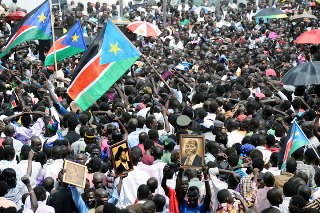52% of S. Sudanese say country heading in wrong direction: poll
July 19, 2013 (JUBA) – At least 52% of South Sudanese have expressed dissatisfaction with the way the government is managing the country’s affairs, a survey conducted by the International Republic Institution (IRI) shows.

‘‘Majority of the South Sudanese, 52% felt that the country is heading in the wrong direction, citing crimes and the security, food shortage, famine and poverty, destitution as key problems facing the country,” said Gabriela Serano, IRI’s South Sudan Country Director.
Conducted between April 24 and May 22, 2013, the survey sampled at least 2,533 adults aged 18 and above in all the 10 South Sudanese states.
The survey assessed a wide range of subjects related to democracy and governance as well as the general environment, the economy, service delivery, attitudes towards government, peace and security, attitudes towards women, constitutional issues and perceptions towards political parties.
While some respondents said the government needed to do more to improve living standards, 64% said their life is better off than it was before the country attained independence two years ago.
68% of the respondents remained satisfied or very satisfied with the performance of the Sudan People’s Liberation Movement as the country’s ruling political party while 71% said they had a very favorable or favorable impression of President Salva Kiir, a slight slope from the 82% rating in the September 2011 survey.
On the impact of the decision of the government of South Sudan to shut oil production from January 2012 to April 2013, 82% said the decision impacted on them. 54% said shutting oil production, the country’s largest source of revenue, was a wrong decision by government.
On resumption of oil production, 90% of the respondents said it will have a positive impact on their lives.
The survey also found that 56% of respondents have no knowledge of the constitutional making process and 59 percent of those polled had heard nothing from the government institution that will be in charge of drafting the new constitution.
However, 49% said it was important to consult citizens during the process of drafting process.
The latest poll US-based institute is the third to be conducted in South Sudan. The outcome of the poll is closely followed by the policy makers and senior government officials.
REACTION TO THE POLLS
Atem Yaak Atem, the deputy information hailed the poll, saying there was need for the government to improve on its shortcomings other than running away from reality.
On the timing of the report, however, Atem said he does not believe it was conducted with ill motives. There is already an ongoing jostling for top political positions, as South Sudan goes to the polls in 2015.
Mark Nyipuoc, a senior member of the south-ruling party (SPLM) said opinion polls are very important because they create awareness and identify needs of the population.
As a result, he added, the public has become a more important player in national affairs in South Sudan.
Ohide Wilfred, a student of Juba University said food shortage and insecurity is a big problem in the country adding that the opinion poll has substance.
Garang Deng, a native of Northern Bahr el Ghazal currently visiting Juba believes that the poll has provided leaders with ideas on what policy to promote
“I am not surprised about the result. I know the importance of the opinion polls myself because I lived in the United States of America where opinion survey is carried out regularly by the government through research groups and institution,” he told Sudan Tribune Friday.
The polls provide leaders with idea of what to do to promote policies, he added.
(ST)
